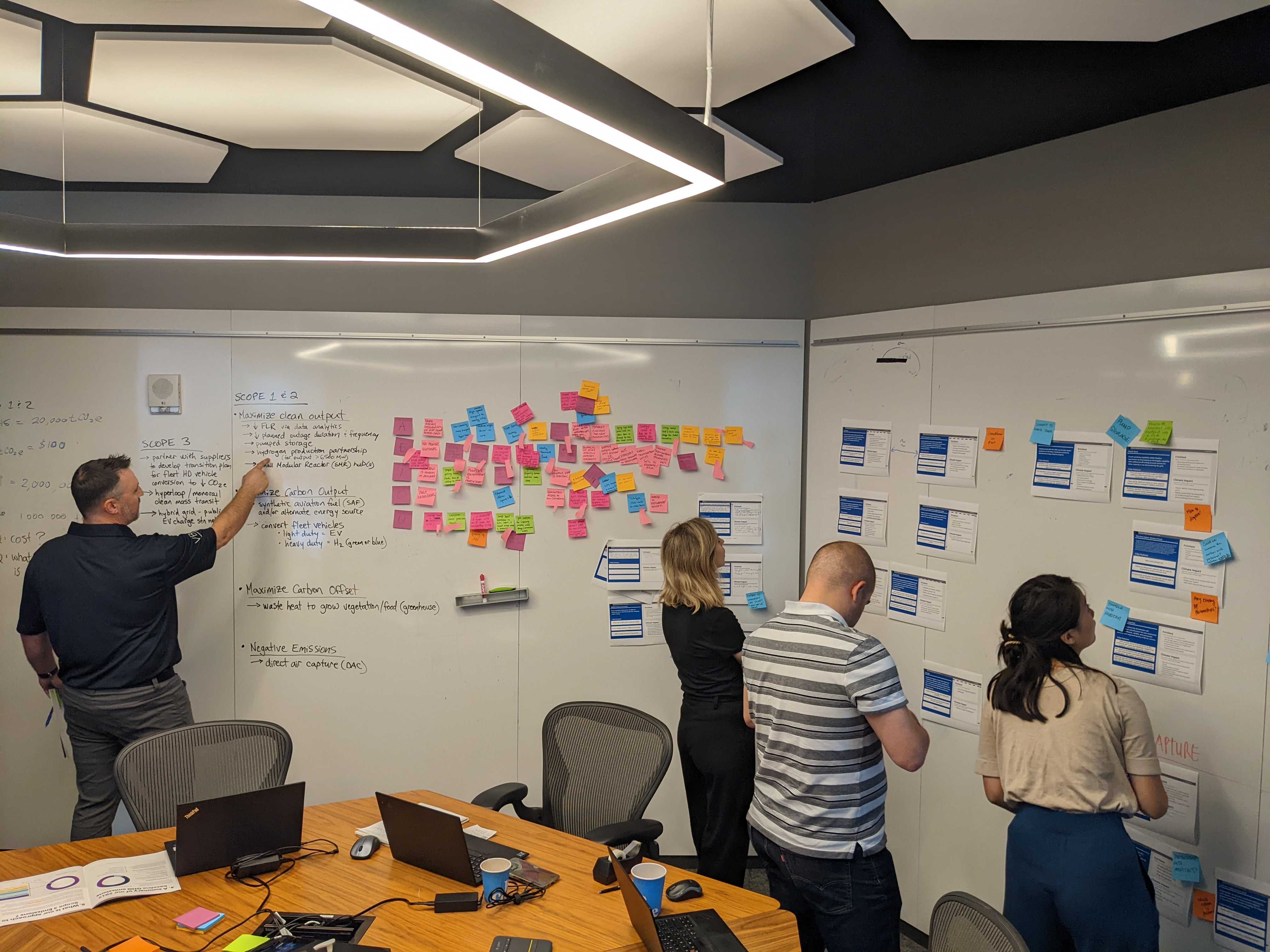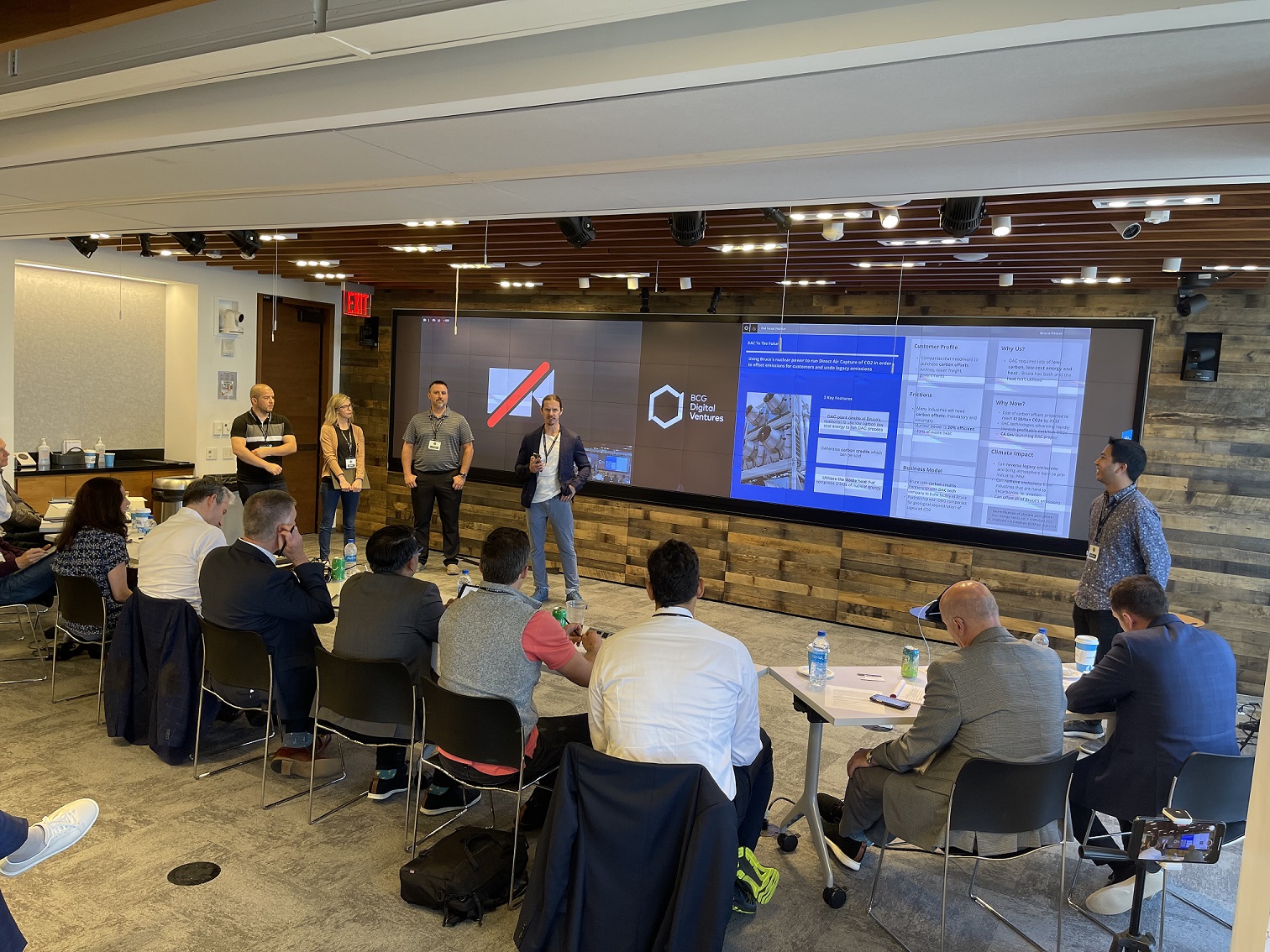Over the course of one week in June, OMERS Infrastructure, six of its portfolio companies and BCG Digital Ventures (BCGDV) met to collaborate on climate change solutions. The outcome, beyond the incredible dialogue and networking for the 45 participants, was more than 30 innovative ideas that collectively could result in significant emissions reduction.
The OMERS Infrastructure portfolio companies that participated in the week were Bruce Power, FRV, Leeward Energy, Puget Sound Energy, Teranet and Thames Water, representing three continents and diverse sectors including energy transition, natural systems and community infrastructure.
Beginning the week of June 13, the group worked through intense ideation sessions, sharing climate and energy transition-related challenges, institutional capabilities, and ideas, culminating in a ‘shark tank’ pitch session with senior management from the six portfolio companies, OMERS Infrastructure and BCGDV. The group worked through a structured diverge-then-converge innovation process, first to break free from assumptions and flip orthodoxies, and then to prioritize, polish and hone in on the most promising ideas. The ideation took on a momentum of its own, as participants – despite most of whom having not met each other before the event – continued to evolve the ideas after hours.
The OMERS Infrastructure team pursued this Hack-the-Climate for two key reasons. The first was to bring together representatives from portfolio companies and the OMERS Infrastructure team to build relationships, learn about one another in the context of a specific challenge, and understand ways in which the portfolio might work together in the future. The second reason was to share knowledge and exchange ideas around how to accelerate and scale solutions that address climate change. Both objectives were clearly accomplished.
What ideas did we come up with?
Ideas and creativity were plentiful including:
“ReNew”, a secondary marketplace for renewable energy equipment;
“Smart Site”, a site identification solution for project developers that saves time and costs;
“Leakify”, an easy to use app that listens for water leaks in the home; and
“ClimeScore”, a platform for home buyers and other market actors to understand the carbon impact and climate risk of a home or a portfolio of properties.
Teams were equally creative with concept names, such as “CANDU Altitude”, an enterprise to use nuclear reactors to power the production of synthetic, carbon neutral aviation fuel and diesel.
What’s next?
The week-long “hack” was the first phase in what could ultimately lead to the development of innovation. The pitches highlighted several interesting ‘problem spaces’ that will impact vast segments of the green transition. The next phase involves aggregating the most promising ideas into potential solutions for industry-wide challenges, for OMERS Infrastructure and its portfolio companies to continue to build to deliver value, including climate benefits.
OMERS Infrastructure views the prioritization of climate solutions that both reduce carbon emissions and mitigate and adapt to climate risk as essential to the ongoing development and management of a sustainable and resilient portfolio of assets. This approach also aligns with OMERS November 2021 commitment to achieve net-zero greenhouse gas emissions across its total portfolio by 2050.
2021 experienced the largest annual increase in greenhouse gas emissions into the atmosphere ever. Identifying new climate change solutions requires widespread collaboration, innovation, speed and scale, which in turn requires setting aside time and space for creative and motivated minds to step-back and think big while strengthening existing and forming new partnerships.
And a big thank you to everybody who took part!
The views expressed in this article are not to be taken as advice or a recommendation to buy or sell any investment in any jurisdiction. Any information or opinions are provided for informational purposes only, and are subject to change without notice. Neither OMERS nor OMERS Infrastructure nor any of their affiliates makes any representation or warranty, express or implied, as to the accuracy, reliability or completeness of any information contained in this article, and any liability therefore is expressly disclaimed. OMERS Infrastructure is not providing any financial, economic, legal, accounting or tax advice or recommendations in this article.



